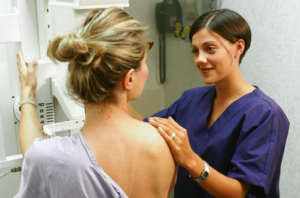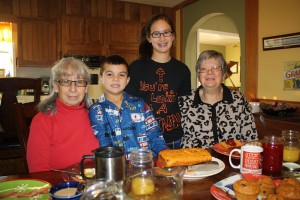According to the National Breast Cancer Foundation:
- 200,000 new cases of breast cancer will be diagnosed this year
- Breast cancer claims 40,000 lives annually
- 1 in 7 women will be diagnosed with breast cancer in their lifetime
In light of the rise in breast cancer over the last 50 years and because early detection can be the difference between life and death, physicians and women’s health organizations agree that Mammograms Really Do Matter.
My mom’s mom was diagnosed with breast cancer in 1977. Her radical mastectomy left her with lymphedema in her left arm. While she was a 20 year breast cancer survivor at her death in 1997, her affected arm, which was heavy, awkward, and twice the size of her right arm, left an impression on me as a child.
My mother received a phone call the day after a routine mammogram in 2011. She searched her breasts for 24 hours and was unable to find a lump. The doctor found the mass during the next day’s ultrasound and a needle biopsy confirmed their suspicions. The tumor was small and she is cancer free after 4 months of chemotherapy and bilateral mastectomies.
Our family history (while my mother did not test positive for BRCA genes) and fibrocystic breast changes caused me to request my first mammogram 3 years ago at the age of 37. My mammogram was normal and served as a baseline for my annual mammograms the last 2 years.
While mammography has its limitations, annual mammograms:
- Can detect cancer early – when it’s most treatable
- Can show breast changes up to 3 years before a woman (or her physician) can feel them
- Can help the patient avoid extensive treatment for advanced cancers
- Can (because of early detection) improve the chances of breast conservation
- Can ease anxiety for young women with risk factors
The American Cancer Society, the National Cancer Institute, the American College of Radiology, and the Society for Breast Imaging recommend that women receive annual mammograms starting at age 40 – even if they have no symptoms or family history of breast cancer, as:
- 1 in 6 breast cancers occur in women aged 40-49
- Breast cancer is the leading cause of death for women aged 40 to 55
- 75 – 80% of women diagnosed with breast cancer have no family history of the disease and are not considered high risk
While most women diagnosed with breast cancer are not considered high risk,there are risk factors to consider. We can do little about many breast cancer risk factors (gender, aging, genetic risk, family history, race and ethnicity, and dense breast tissue); however, women must also proactively reduce risks where possible. If you smoke, drink alcohol in excess, do not have healthy eating habits, or are on hormone therapy or hormone based contraceptives look into how these situations might increase your risks for developing breast cancer.
In so many areas of life, and particularly when it comes to one’s health, one might prefer to live in denial. Until something is diagnosed, we often allow ourselves to believe it’s not something we have to deal with. My baseline mammogram, as a proactive measure, gave me peace of mind and confidence in my breast health.
Do you fall within the recommended age for a mammogram? If you haven’t scheduled your baseline, what’s holding you back? Join the conversation by commenting at the top of this post.
Before you leave this site, follow my blog (top, right of this post). It’s quick and easy 🙂
For more from Marea, check out Me and Thee Studios’ faith based leveled readers for 1st-2nd graders at http://www.meandtheestudios.com/early-reader-collection.html.


